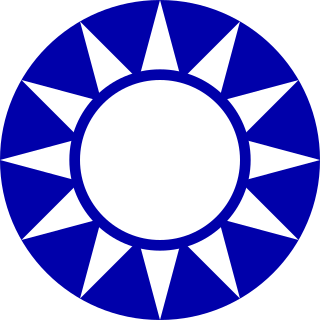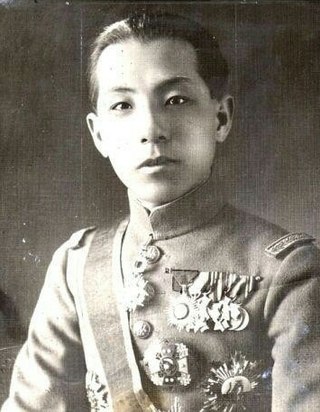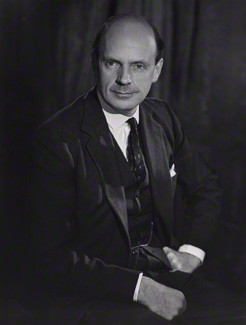- Insignia of the Grand Commander of the Order of the Republic of The Gambia, awarded to Chiang Kai-shek in 1972, on display at Chiang Kai-shek Memorial Hall in 2023.
Related Research Articles

Chiang Kai-shek was a Chinese politician, revolutionary, and military commander who was the leader of the Nationalist Kuomintang (KMT) party and commander-in-chief and Generalissimo of the National Revolutionary Army (NRA) from 1926, and leader of the Republic of China (ROC) in mainland China from 1928. After Chiang was defeated in the Chinese Civil War by the Chinese Communist Party (CCP) in 1949, he continued to lead the Republic of China on the island of Taiwan until his death in 1975. He was considered the legitimate head of China by the United Nations until 1971.

The Kuomintang (KMT), also referred to as the Guomindang (GMD), the Nationalist Party of China (NPC) the Chinese Nationalist Party (CNP), or the National People's Party of China, is a political party in the Republic of China, initially based on the Chinese mainland and then in Taiwan since 1949. The KMT is a centre-right to right-wing party and the largest in the Pan-Blue Coalition, one of the two main political groups in Taiwan. Its primary rival is the Democratic Progressive Party (DPP), the largest party in the Pan-Green Coalition. As of 2024, the KMT is the largest single party in the Legislative Yuan. The current chairman is Eric Chu.

Soong Mei-ling, also known as Madame Chiang, was a Chinese political figure. The youngest of the Soong sisters, she married Chiang Kai-shek and played a prominent role in Chinese politics and foreign relations in the first half of the 20th century.

Zhang Xueliang was a Chinese general who in 1928 succeeded his father Zhang Zuolin as the commander of the Northeastern Army. He is best known for his role in the Xi'an Incident in 1936, in which he arrested Chiang Kai-shek and forced him to form a Second United Front with the Chinese Communist Party against the Japanese.

The president of the Republic of China, also known as the president of Taiwan, is the head of state of the Republic of China, commonly known as Taiwan, as well as the commander-in-chief of the Republic of China Armed Forces. Before 1949 the position had the authority of ruling over Mainland China, but after communist victory in the Chinese Civil War, the remaining jurisdictions of the ROC have been limited to Taiwan, Penghu, Kinmen, Matsu, and smaller islands.

Chiang Ching-kuo was a politician of the Republic of China. The eldest and only biological son of Generalissimo Chiang Kai-shek, he held numerous posts in the government of the Republic of China and ended martial law in 1987. He served as the 3rd premier of the Republic of China between 1972 and 1978 and was president of the Republic of China from 1978 until his death in 1988.

Yen Chia-kan, also known as C. K. Yen, was a Chinese-Taiwanese chemist and Kuomintang politician. He succeeded Chiang Kai-shek as the 2nd president of the Republic of China on 5 April 1975, being sworn in on 6 April 1975, and served out the remainder of Chiang's term until 20 May 1978.

Zhang Qun, was a Chinese politician and premier of the Republic of China and a prominent member of the Kuomintang. He served as secretary general to the President of the Republic from 1954 to 1972 and senior advisor to Presidents Chiang Kai-shek, Yen Chia-kan, Chiang Ching-kuo, and Lee Teng-hui. Under the influence of his wife, Ma Yu-ying, he became a Christian in the 1930s.

Chiang Wei-kuo, also known as Wego Chiang, was the adopted son of Republic of China President Chiang Kai-shek, the adoptive brother of President Chiang Ching-kuo, a retired Army general, and an important figure in the Kuomintang. His courtesy names were Jian'gao (建鎬) and Niantang (念堂). Chiang served in the Wehrmacht before fighting in the Second Sino-Japanese War and Chinese Civil War.

The Chiang Kai-shek Memorial Hall is a national monument and tourist attraction erected in memory of Chiang Kai-shek, former President of the Republic of China. It is located in Taipei, Taiwan (ROC).

The Presidential Office Building is the work place of the president of the Republic of China on Taiwan. The building, located in the Zhongzheng District in the national capital — Taipei, was designed by architect Uheiji Nagano during the period of Japanese rule of Taiwan (1895–1945). The structure originally housed the Office of the Governor-General of Taiwan. The right wing of the building was damaged in Allied bombing during World War II, which was restored after the war by Chen Yi, the governor-general of Taiwan Province. It became the Presidential Office in 1950 after the government of the Republic of China lost control of mainland China and relocated the nation's capital to Taipei at the end of the Chinese Civil War. At present, this Baroque-style building is a symbol of the central government and a famous historical landmark in downtown Taipei.

Lieutenant-Colonel Martin Michael Charles Charteris, Baron Charteris of Amisfield, was a British Army officer and courtier of Queen Elizabeth II. Charteris was the longest-serving Assistant Private Secretary to the Sovereign, having served for over 18 years in that position. Later, he became Private Secretary to the Sovereign.
Events from the year 1975 in Taiwan, Republic of China. This year is numbered Minguo 64 according to the official Republic of China calendar.

The Order of Brilliant Jade is a civilian order of the Republic of China that can be worn only by the head of a nation. According to regulations, the order can only be presented by the president of the country or an emissary expressly dispatched to friendly nations for the conferment. The order was instituted on 22 December 1933. It has a star-patterned face of inlaid jade bordered with gold and pearls. In the centre there is white sun surrounded by blue sky, the national emblem. Previously, the Order of the Brilliant Jade was divided into two, namely Grand Order of Brilliant Jade (current) and Order of Brilliant Jade with nine ranks.
Events from the year 2006 in Taiwan, Republic of China. This year is numbered Minguo 95 according to the official Republic of China calendar.

Chiang Wan-an, also known as Wayne Chiang, is a Taiwanese politician and lawyer who has served as the mayor of Taipei since December 2022. He is the youngest mayor of Taipei since the appointment of Chang Feng-hsu.
The Order of the Lion was, at one point, the highest state order, and the second highest honour bestowed by the government of Malawi.

Following their defeat in the Chinese Civil War, on December 7, 1949, the remnants of the Nationalist government of the Republic of China (ROC), alongside many refugees, retreated to the island of Taiwan (Formosa). The exodus is sometimes called the Great Retreat in Taiwan. The Nationalist Kuomintang party (KMT), its officers, and approximately 2 million ROC troops took part in the retreat, in addition to many civilians and refugees, fleeing the advance of the People's Liberation Army (PLA) of the Chinese Communist Party (CCP). The CCP, who now effectively controlled most of mainland China, spent the subsequent years purging any remnant Nationalist agents in western and southern China, solidifying the rule of the newly established People's Republic of China (PRC).

On April 5, 1975, at 23:50 TWT, Chiang Kai-shek, Generalissimo and President of the Republic of China, died of a heart attack resulting from kidney failure caused by advanced heart failure and pneumonia at the Taipei Veterans General Hospital in Taipei, Taiwan, at the age of 87.
References
- 1 2 Vines, Alex (22 January 2016). "The Gambia: Africa's new Islamic republic". BBC News . Retrieved 5 June 2023.
- ↑ "Gambia marks 55 years of independence". PanAfrican News Agency . February 18, 2020. Retrieved June 5, 2023.
- ↑ "Burke's Peerage and Gentry > The Royal Family > HM Queen Elizabeth II". Burke's Peerage & Gentry and The Origins Network. Archived from the original on 1 December 2009. Retrieved 24 October 2010.
- ↑ Maduabuchi, Dukor (2018). Mohammed Chris Alli's The Federal Republic of Nigerian Army: Symposium on Sage Philosophy. Malthouse Press. p. 4. ISBN 9785579824.
- ↑ "World's "Top Prosecutor" to Speak at SUU". suu.edu. Southern Utah University . Retrieved June 5, 2023.
